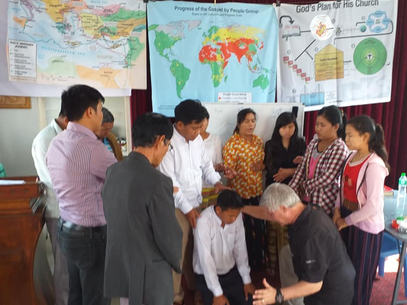 Randy reports of a good time in Mandalay training a group of pastors through God’s Plan for His Church (GPHC). “We had only one graduate, but God is really working here. I will be back April 8-16 to do a follow-up training in Mandalay with more to graduate, and then go to Shan State for a Water Festival, a cultural holiday. At the Water Festival we will present God’s Plan for His Disciples (GPHD) to over 100 people from different churches that gather for the holiday event. Praise the Lord!” These are exciting times for us. In a few days, I will report on recent visits to Cambodia and Laos where GPHD is being translated into Lao and Khmer. God is taking our little efforts and multiplying them in ways we never imagined.
0 Comments
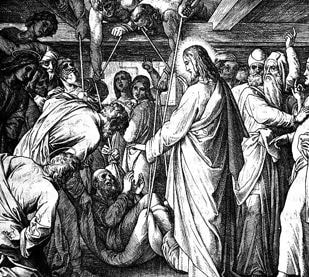 Often those with large hearts for the lost are overruled by some who have objections and long lists of reasons why some people should not be evangelized. Hudson Taylor went to China without the support of any organization and God made him succeed. He too, faced many opposing voices. Among many examples in Jesus’ life was the four men who were concerned about the life of a paralytic man. Crowds prevented them from reaching Jesus with this man the normal way. “They were seeking to bring him in and lay him before Jesus, but finding no way to bring him in, they went up on the roof and let him down with his bed through the tiles into the midst before Jesus” (Luke 5:18-19). The order of events in this case are very important to observe: 1. After lowering this man through the roof, Jesus commends the four men for their faith (5:20). God never overlooks our faith in doing His will and in overcoming obstacles. 2. Jesus does not deal with the man’s physical condition first. He deals with the man’s sins. Physical needs are important, but the soul and its relationship to God takes priority over every other consideration. NOTE: This move of Jesus meets with strong opposition from the religious leaders. We may face the same reaction. 3. Jesus then challenges the faith of the religious leaders. They had neither the power to forgive sins or heal the man physically. Both powers are in the person of Jesus, and that is why HE MUST BE PROCLAIMED FIRST! 4. God must receive the glory for forgiveness, salvations and healings. When we stop listening to the objections of men, we will see the power of God as we obediently reach those who have never heard the message of the gospel. Put faith to work!  As I pondered the experience of Peter in Acts 10 and his statement in verse 34-35, I wondered how many in the Church down through the centuries have looked at missions with some sort of discrimination in our hearts? Read the conviction that Peter came to: “Peter opened his mouth and said: “Truly I understand that God shows no partiality, but in every nation anyone who fears Him and does what is right is acceptable to Him.”” Anyone who has a genuine interest in missions knows that most of the missionaries who had the greatest impact were those who heard the call of God to preach the gospel to people they did not know and lived in a very different culture. What was it that propelled them to “GO” with reckless abandonment of their own comforts and familiar surroundings? Peter labeled what he saw in the “great sheet” of Acts 10:10-12 as “common or unclean.” He was quickly corrected by “the voice [that] came to him again a second time, “What God has made clean, do not call common”” (10:15). There is some ‘correcting’ that needs to be done today. We must see every man, woman and child as created in the image of God (Genesis 1:26). God has placed in mankind a value that is not found in any other part of creation. We were made for God’s glory (Ephesians 1:12, 14). With that in mind, it is imperative that we proclaim the gospel so every people group around the world can live for the purpose inherent in their creation. Once we see people through God’s eyes, His purpose and His love for them, we will stop being partial in our missions. The phrase “does what is right is acceptable to Him” results from hearing the gospel and believing its truth. God is looking for messengers who are not partial.  Certain words are central to the proclamation of the gospel, yet the culture we live in resists these words. When Jesus was leaving the disciples with the very important responsibility of carrying on the work He started, He said to them “that repentance and forgiveness of sins should be proclaimed in His name to all nations (ethne – people groups), beginning at Jerusalem” (Luke 24:47). Two of those three words have been a problem for many who want to attend a church without having their heart and conscience brought under the conviction of the Holy Spirit. What many do not understand is that “forgiveness” cannot be received unless, (1) we understand that our lost condition is because of sin (Romans 3:23). The purpose of Christ’s death was to deal once and for all with the condition that sin brought on the human race (God’s condemnation 6:23). His death, burial and resurrection were to remove the penalty, guilt and judgment of God from our souls. (2) The path to “forgiveness” can only be traveled through “repentance.” Once the soul receives the conviction of the Holy Spirit, we agree with the righteousness of God and accept that Jesus had to die in our place to remove our guilt before God. The coming of the Holy Spirit immediately proved that this was the only path to forgiveness.” On that first day of the Church when Peter preached to the crowds, they asked, “Brothers, what shall we do?” And Peter said to them, “Repent and be baptized every one of you in the name of Jesus Christ for the forgiveness of sins…” (Acts 2:37-38). Though “repentance” is not a popular idea, it is the only way to receive “forgiveness” of sins. Do not leave this out of your message. 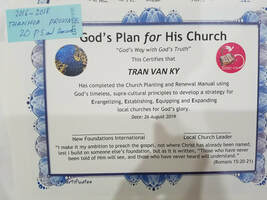 This report of what God is doing in North Vietnam is heartwarming and reminds us that biblical methods really work. “I remember several years ago training in north Vietnam along the border of China among the Hmong and Dao people groups. It seemed that we got nowhere as God’s Plan for His Church was presented. In fact, during one of our meetings, the police came in and shut down the meeting. Things are so different now that we have handed over the training to an indigenous leader. This dear brother is having a tremendous harvest among those same groups with many completing the Vietnamese and the Hmong God's Plan for His Church (See the attached picture of GPHC diplomas being awarded and the Hmong family traveling by foot). They really take these diplomas seriously, but more importantly, they are applying what they learned from Scripture to their church planting among other minority groups. We praise God that these indigenous people are self-sustaining and self-supporting!” (Tim) “I am very excited after finishing my time in Tamu, Myanmar at the EBC. It's amazing to me how God works in brother’s hearts when they see from Scripture that something is not right with the model of "church" that they have been using. This is what has happened here in the lives of two brothers in particular, but also could be quickly becoming the predominating thought of the church leaders as a whole.
The annual conference for all the EBC churches in Myanmar represents about 100 churches. I met a brother who is part of the mission’s "wing" with a vision to reach the unreached of Myanmar. His vision is to reach all the unreached people groups of Myanmar by 2025! What is also amazing is that his strategy for missionaries is that they work jobs as they “GO” into the unreached areas! He does not want them to be supported by the churches for more than 3-5 years maximum. He has asked if we could have a training session in May for 1 to 2 weeks going through GPHD and then introduce GPHC for the missionaries to start working on. God is certainly moving in this. The amount of rejoicing and excitement with all was just unbelievable! I am overwhelmed by God's grace. I was thinking on my ride back to Kalaymyo today, through tears, how incredibly amazing we are to be in on this work of God. In addition to all this, I learned that a Rakhine believer who has been discipling brothers over the phone in refugee camps, and our training manuals are in high demand. Thank you for all of your prayers. (Romans 15:20).” Jonathan NOTE: The translation of God's Plan for His Disciples in Burmese is complete. 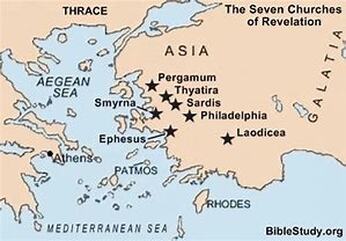 As I prepare my message for Sunday morning, I am struck with the phrase, “you have kept My word” (Revelation 3:8). Jesus repeats this statement in verse 10. What alerts my mind and heart to this statement is the circumstances of the church at Philadelphia. To start with, Jesus admits that they had “little power,” meaning, they had very little power, they were weak, and from a human view, it would seem that they could be overcome at any moment by the forces that were arrayed against them. What did they face? · There was increasing pressure to give up the authority of God’s Word. This is often done today in Western cultures by “redefining” the words of Scripture to allow for popular trends to be accepted in the church. · Following the crowd would mean denying the Lord Jesus and following self-proclaimed leaders. · The synagogue of the Jews had become so radical against Christianity that Jesus calls it “the synagogue of Satan.” It was a bed of liars. · Persecution was intense and it appeared that “open doors” would soon close. With all these factors pushing their weight against the believers in the Philadelphian church, they used the “little power” they had to stand firm in their faith. In the eyes of Jesus, these saints were “pillars in the temple of God” (3:12). Nothing would move them from the Word of the Lord and His name. I wonder how many of us are standing true, even in our weakness, against such forces? 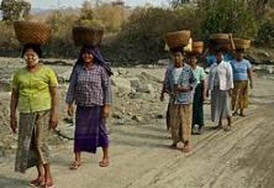 Jonathan has been in Tamu, Myanmar the last few days. He is very excited about the opportunities to present GPHD for 3.5 hours to approximately 40 plus indigenous missionaries. Please pray for this conference and the missionaries/church leaders who attend. This is a Chin group of believers and they are primarily known for being very rigid traditionalists and tend to be opposed to any type of change. The Chin, as a people group, stay in conflict with the neighboring Burmese villages because they are not Buddhists. Such conditions call for a radical proclamation of the gospel, both in word and lived out by believers. Pray that some of these barriers can be broken down by the power of God’s Word and the Holy Spirit. These brothers and sisters seem to want to go and reach the Burmese. This area of Myanmar is a melting pot of Nepalese and other ethnic groups here in Tamu and the surrounding areas of Saigaing Region that they have already planted churches. As we pray for these believers in Tamu, we must remember for them and for ourselves the words of Jesus; “Go into all the world and proclaim the gospel to the whole creation” (Mark 16:15). The responsibility falls on all of us, wherever we are and whatever resources we have, and God has given each of us what we need to obey His command – even fervent prayer! When we think of suffering for Christ, often our focus concentrates on the pain and loss side of what we are going through. Perhaps we need to look again at Paul as our model. While many saints have suffered excruciating and lengthy periods of torment, only to end in death, Paul gives us a perspective that I rarely think about. It sprang from his intense longing to know Christ more.
“Indeed, I count everything as loss because of the surpassing worth of knowing Christ Jesus my Lord. For His sake I have suffered the loss of all things and count them as rubbish, in order that I may gain Christ…that I may know him and the power of His resurrection, and may share His sufferings, becoming like Him in his death” (Philippians 3:8, 10). I see four points in Paul’s statement that we should imitate in our walk here for Christ: 1. Always want to know more of Christ. Everything else has no value. 2. What we have gained in this life is rubbish compared to becoming more like Christ. 3. Knowing the power of resurrection working in us enables us to suffer in whatever way we are called on to suffer with Christ. 4. Sharing is Christ’s suffering-– even in death is fellowship with Jesus in what He did for us. Hudson Taylor said, “Fruit-bearing involves cross-bearing.” Perhaps the death of Stephen in Acts 7 was engraved on Paul’s mind. He died seeing the glory of Christ. That is a special fellowship! As the work of spreading the gospel to every people group (ethne) around the world moves forward, often in hostile environments, it is good to remember the advice Jesus gave to His disciples. In reference to the end times, He said, “Then they will deliver you up to tribulation and put you to death, and you will be hated by all nations for My name’s sake” (Matthew 24:9; see also 10:22).
We certainly should not be going around looking for the world to hate us or inflict persecution on the Church, but it should be expected from the world. Notice how Jesus presents this in John 15; “If the world hates you, know that it has hated Me before it hated you. If you were of the world, the world would love you as its own; but because you are not of the world, but I chose you out of the world, therefore the world hates you” (John 15:18–19). Let us remember that every believer has transferred their citizenship and loyalty from this world to a heavenly kingdom. But more than that, Jesus has chosen us “out of the world” and it has no claim on us. He repeats this in His prayer to the Father; “I have given them your word, and the world has hated them because they are not of the world, just as I am not of the world. I do not ask that you take them out of the world, but that you keep them from the evil one. They are not of the world, just as I am not of the world” (17:14–16). The Word and Jesus both cause hatred. These two principles must go together; hated by the world because we are not of the world. As we pursue living for Christ and the glory of God, let us not be surprised by hatred aimed at us, because our citizenship is not here; “But our citizenship is in heaven, and from it we await a Savior, the Lord Jesus Christ” (Philippians 3:20). |
Archives
June 2024
Link To Our Old Blog:
|


 RSS Feed
RSS Feed